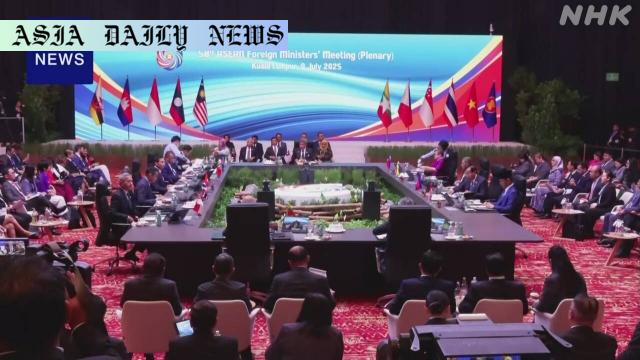ASEAN tariffs voiced strong concerns during their Malaysia meeting over the economic impact of US unilateral tariffs and geopolitical tensions.
ASEAN leaders voiced concerns over US unilateral tariffs.
Malaysian PM stressed the need for ASEAN unity against trade barriers.
Tariffs and geopolitical rivalry threaten ASEAN’s economic stability.
US Secretary of State expected to address tariffs in Thursday’s meeting.

Introduction to ASEAN’s Concerns Over US Tariffs
During a critical meeting in Malaysia’s capital Kuala Lumpur, the foreign ministers of the Association of Southeast Asian Nations (ASEAN) expressed significant concerns over the economic impact of U.S. unilateral tariff measures introduced under former President Donald Trump’s administration. The event underscored the mounting tension caused by protectionist trade policies, which are increasingly being used as tools for geopolitical maneuvering.
Economic Impacts and Malaysian PM’s Call for Unity
Malaysian Prime Minister Anwar Ibrahim’s opening remarks carved out the foundation of the discussion. Referencing the reality of ‘tariffs, export restrictions, and investment barriers,’ he emphasized how such measures have become key instruments of geopolitical rivalry. Ibrahim’s call for ASEAN unity is both timely and essential, as economic growth across the bloc faces tangible risks from such unilateral actions. The gathered ministers reiterated their commitment to collaboration, intending to mitigate the overarching negative implications such policies could impose on regional stability and development.
ASEAN’s Direction Amid Geopolitical Rivalries
This year’s meeting holds particular significance as ASEAN struggles to maintain its trajectory in the face of external pressures. Member states are at a crossroads, demanding collective measures to navigate the maze of trade wars and political contention. Diplomatic sources suggest that the internal discussions on Wednesday strongly reflected the bloc’s unified stance against divisive tariff policies, prompting broader expectations of negotiations with US Secretary of State Marco Rubio on Thursday. The engagement promises to bring some perspective on the possibility of recalibrating relations and fostering new agreements that could help stabilize mutual economic interests.
The Bigger Picture: Tariffs and Regional Stability
While the focal point of tariffs received significant attention, the meeting also addressed other pressing concerns, such as the political turmoil in Myanmar. However, the economic narrative dominated much of the proceedings, with strong consensus forming around the need for proactive responses to the challenges posed by external trade policies and the risks of economic imbalance. ASEAN aims not merely to address immediate impacts but also to establish long-term strategies to counter the challenges posed by global geopolitical shifts.
Conclusion and Anticipation of US Engagement
As ASEAN leaders prepare to engage with US representatives in the coming days, their unified voice on the issue of tariffs is a demonstration of the bloc’s growing maturity and determination. Thursday’s interactions could pave the way for enhanced dialogue and perhaps even shape a more cooperative approach to mitigate economic challenges. However, much depends on the willingness and flexibility of the US to reconsider its approach and align with the principles of mutual benefit and respect for regional advancements.
Commentary
ASEAN’s Growing Challenges in an Evolving Global Order
The recent expression of concern by ASEAN foreign ministers over the unilateral tariff strategies of the United States was a poignant reminder of the interconnectedness of global economies. In a region that has seen remarkable economic growth and stability over the decades, the imposition of such tariffs threatens to disrupt carefully built regional ecosystems.
Malaysian PM’s Call for Unity – A Voice of Reason
Prime Minister Anwar Ibrahim’s plea for ASEAN unity couldn’t have been timelier. His acknowledgment of tariffs as sharp instruments of geopolitical rivalry was both insightful and a stark reality check. As a region rich in resources and strategically critical to global trade, ASEAN cannot afford to be fragmented by external powers wielding trade as a weapon. By standing together, the bloc not only protects its interests but also signals to the global community its intention to act as a cohesive and collaborative entity.
Navigating Talks with the US
The forthcoming meeting with US Secretary of State Marco Rubio represents an opportunity for ASEAN to articulate its stance effectively. It’s an opening for both sides to assess how a partnership based on mutual respect and understanding can contribute to resolving economic discord. However, the meeting’s success heavily depends on compromise and forward-looking strategies that prioritize growth without suppressing fair competition.
Broader Implications for Global Trade
The ASEAN-US tariff standoff holds lessons for the larger global community. It underscores the need for balanced policy-making, where economic strategies align with global stability goals. As ASEAN steers its way through these challenges, its actions could serve as a model for other regions grappling with similar issues, emphasizing the importance of dialogue and unity in addressing global economic shifts.


